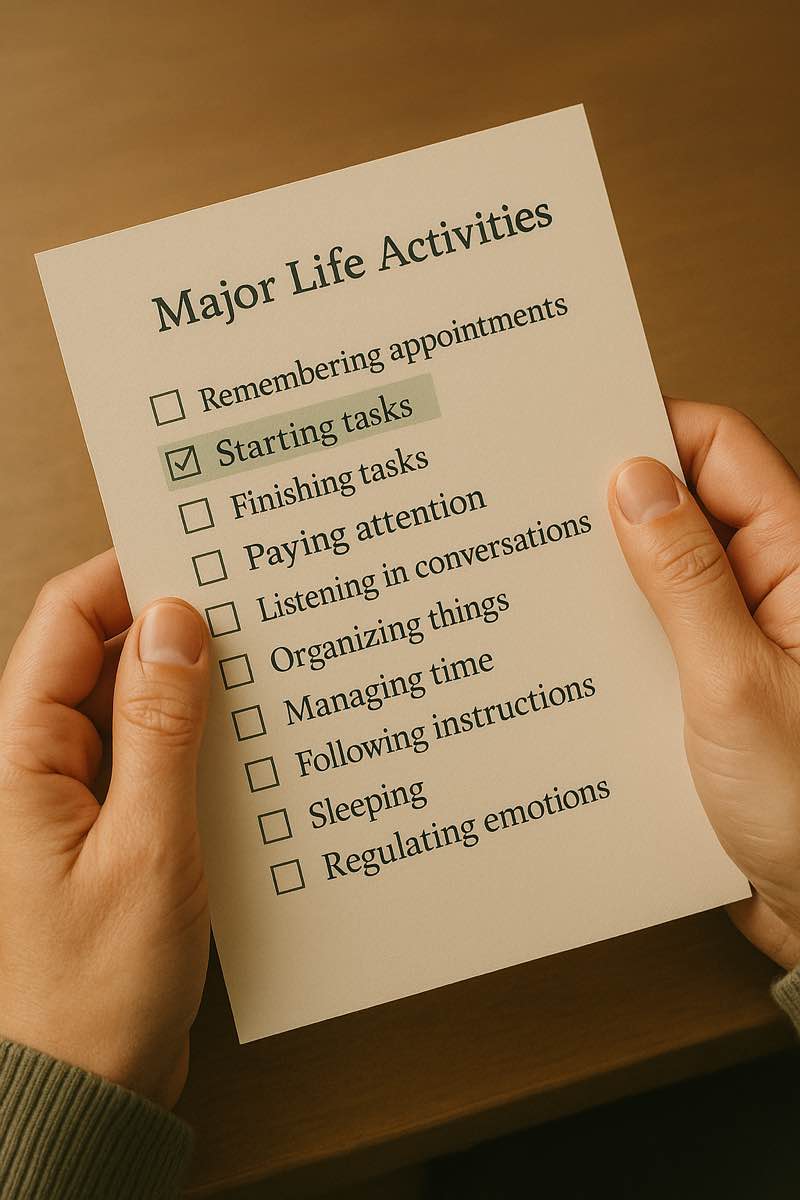Is ADHD a Disability? Complete Guide Explained
The short answer is yes. ADHD is recognized as a disability when it substantially limits major life activities such as concentrating, learning, working, communicating, or managing oneself. This recognition matters for clinical care, legal protections, and practical accommodations in daily life.
Adult ADHD evaluation typically includes documenting symptoms and the ways they limit major life activities. If those limitations are significant and long-term, ADHD is recognized as a disability and you're entitled to reasonable accommodations at school and work.
You can start with a comprehensive self-assessment to organize your thoughts before meeting a professional.

Legal Definition of Disability
Most disability laws define disability as a physical or mental impairment that substantially limits one or more major life activities. ADHD often qualifies when symptoms interfere with work, school, or daily routines.
Major Life Activities Affected by ADHD
| Option | Description |
|---|---|
| Concentrating | Difficulty sustaining attention during work tasks, meetings, or important conversations |
| Learning | Challenges with studying, retaining information, following complex instructions, or academic performance |
| Working | Problems with task completion, time management, organization, or meeting workplace expectations |
| Communicating | Interrupting others, difficulty listening, trouble expressing thoughts clearly in appropriate settings |
| Self,Management | Challenges with daily routines, personal organization, emotional regulation, or impulse control |
| Social Functioning | Relationship difficulties due to inattention, impulsivity, or emotional dysregulation |
Global Legal Frameworks for ADHD as Disability
Different countries define disability slightly differently, but the principle remains consistent: if ADHD symptoms significantly interfere with daily functioning, legal protections apply.
Why ADHD Qualifies as a Disability
ADHD isn't just about being forgetful or restless. It's a neurodevelopmental condition that disrupts executive functions,planning, attention, time management, emotional regulation. These disruptions often create significant barriers to education, employment, and daily living.
Executive Function Challenges
How ADHD Executive Dysfunction Creates Disability
Working Memory Deficits
Difficulty holding information in mind while working on tasks, leading to frequent mistakes and incomplete work.
Inhibitory Control Problems
Trouble stopping inappropriate responses, leading to impulsive decisions that affect work and relationships.
Cognitive Flexibility Issues
Difficulty switching between tasks or adapting to changing demands, creating problems in dynamic work environments.
Planning and Organization Deficits
Challenges with breaking down complex tasks, managing time, and organizing materials needed for success.
Types of Accommodations That Help
Whether in school or at work, simple adjustments can dramatically improve functioning and outcomes. The best accommodations target executive-function challenges directly.
Workplace Accommodations

| Option | Description |
|---|---|
| Environmental Modifications | Quiet workspaces, noise,canceling headphones, reduced,distraction seating, private office space |
| Task and Schedule Flexibility | Flexible deadlines, extended time for projects, ability to work from home, modified work schedules |
| Communication Supports | Written instructions, meeting summaries, regular check,ins with supervisors, email follow,ups |
| Organization Tools | Task management software, calendars with reminders, project breakdown assistance, priority lists |
| Break and Rest Accommodations | More frequent breaks, longer lunch periods, ability to take walks, stress management time |
| Technology Assistance | Speech,to,text software, reminder apps, time management tools, focus,enhancing apps |
Educational Accommodations
| Option | Description |
|---|---|
| Testing Accommodations | Extended time on exams, quiet testing environments, frequent breaks during long tests |
| Classroom Modifications | Preferential seating, reduced distractions, fidget tools, movement breaks |
| Assignment Supports | Extended deadlines, assignment breakdowns, frequent progress checks, alternative formats |
| Attention and Focus Aids | Note,taking assistance, recorded lectures, visual aids, summary handouts |
| Behavioral Supports | Clear expectations, consistent routines, positive reinforcement systems, self-monitoring tools |
| Technology Integration | Assistive technology, organizational apps, digital calendars, text,to,speech software |
Understanding Disability vs. Benefits Eligibility
It's important to distinguish between civil rights protections (like accommodations) and financial benefits. The standards are different.
Common Questions About ADHD as Disability
Does ADHD automatically qualify as a disability?
No. A diagnosis alone isn't enough. ADHD must cause substantial, long-term impairment in major life activities. The key is demonstrating functional impact, not just having symptoms.
Do I have to disclose my ADHD diagnosis?
You need to state that you have a qualifying condition and need accommodations. You don't need to share every clinical detail, but you must provide enough information to justify the requested accommodations.
What if medication helps my symptoms?
Eligibility considers how you would function without medication. Even if treatment helps, you can still qualify if untreated symptoms would be disabling. Many people with well-managed ADHD still benefit from accommodations.
Can employers or schools deny accommodations?
They can only deny accommodations if they would cause "undue hardship" or fundamentally alter the essential functions of the job or program. Most ADHD accommodations are reasonable and relatively inexpensive.
How to Document ADHD for Disability Purposes
Getting appropriate accommodations requires proper documentation. Here's what you need:
Steps to Document ADHD Disability
Obtain Professional Diagnosis
Get a comprehensive ADHD evaluation from a qualified mental health professional or physician who specializes in ADHD.
Document Functional Limitations
Work with your clinician to clearly describe how ADHD symptoms limit your ability to perform major life activities.
Gather Supporting Evidence
Collect performance reviews, academic records, examples of accommodation needs, and impact on daily functioning.
Request Accommodation Letter
Ask your healthcare provider to write a letter detailing your diagnosis, limitations, and recommended accommodations.
Submit Formal Request
Provide documentation to your employer's HR department, school's disability services office, or relevant accommodation office.
Regional Differences in ADHD Disability Recognition
United States
The ADA has a broad definition of disability, and ADHD often qualifies. The 2008 ADA Amendments Act made it easier to establish disability status by expanding the definition of "substantially limits."
United Kingdom
The Equality Act 2010 requires that the impairment have a "substantial and long-term adverse effect" on daily activities. ADHD typically qualifies when symptoms are persistent and significantly impact functioning.
Canada
Provincial human rights codes vary, but generally provide strong protection. The duty to accommodate is robust, requiring employers and service providers to make adjustments unless they cause undue hardship.
Australia
The Disability Discrimination Act covers conditions that affect mental functions or learning. ADHD is widely recognized, and reasonable adjustments are required in employment and education.
You can start with a comprehensive self-assessment to organize your thoughts before meeting a professional.
Financial Benefits and ADHD
While ADHD can qualify for civil rights protections relatively easily, obtaining financial disability benefits is much more challenging.
Social Security Disability (United States)
Social Security Criteria for ADHD
Severe Impairment Standard
Must demonstrate that ADHD prevents substantial gainful activity , a much higher bar than accommodation eligibility.
Comprehensive Medical Evidence
Requires extensive documentation from multiple healthcare providers showing severe functional limitations.
Work History Analysis
SSA examines whether you can perform any work you've done in the past 15 years, not just your current job.
Vocational Assessment
Evaluates whether you can perform any work that exists in significant numbers in the national economy.
How to Move Forward
If you believe your ADHD substantially limits major life activities, here's your action plan:
Your Next Steps for ADHD Disability Recognition
Document Impact Examples
Create specific examples of how ADHD symptoms limit your functioning at work, school, or in daily life activities.
Seek Professional Evaluation
Get a comprehensive ADHD assessment from a qualified professional who can provide proper documentation.
Request Accommodations
Submit documentation to your employer's HR department, school's disability services office, or relevant accommodation office.
Monitor and Adjust
Track the effectiveness of accommodations and work with providers to make adjustments as needed.
The Bottom Line on ADHD as Disability
ADHD is legally recognized as a disability when it substantially limits major life activities. This recognition opens doors to:
, Workplace accommodations that improve job performance
, Educational supports that enhance learning outcomes
, Legal protections against discrimination
, Access to assistive technology and support services
The key is proper documentation and understanding that accommodations are about leveling the playing field, not providing unfair advantages.
If you're struggling with attention, organization, or impulse control issues that affect your work, education, or daily life, take our free ADHD screening as a first step toward understanding your experiences and accessing appropriate support.
You can start with a comprehensive self-assessment to organize your thoughts before meeting a professional.
This article provides educational information only and does not replace professional medical or legal advice. For personalized guidance about ADHD disability accommodations, consult with qualified healthcare and legal professionals.
